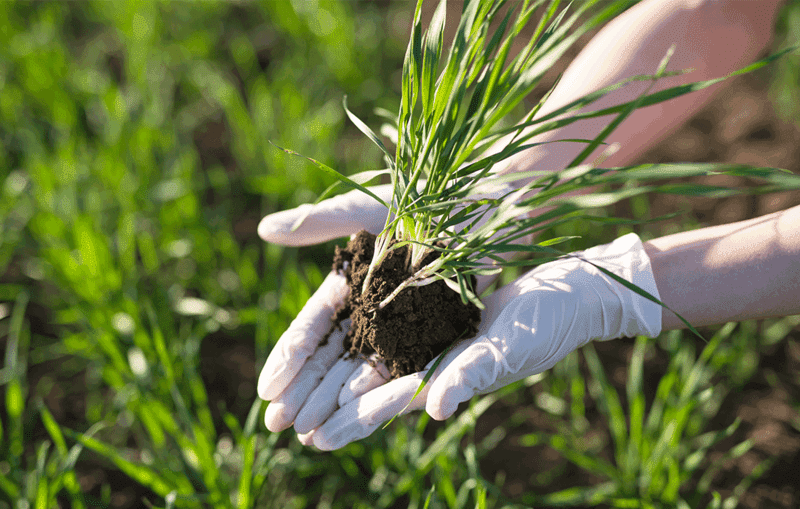
Calcium sulfate fertilizer benefits as a crop & plant nutrient
Calcium sulfate fertilizer
Calcium sulfate fertilizer, also known as gypsum, is a natural source of nutrition for plants. It acts as a balancing element in improving plants’ root development process. Soil though doesn’t have a lot of sulfur. Sulfur in the soil primarily exists in organic matter phase or as a sulfate ion (SO42-) in cation exchange complex.
Calcium sulphate fertilizer is recommended for fertilizing all types of crops, including low sulfur acidic soil. It is recommended for field crops, meadows, vegetables, and orchards. However, Iowa soils inherently have a capacity for providing adequate levels of exchangeable Ca and S for crop growth. so gypsum is not always necessary for Iowa soils.
Top Calcium Sulfate fertilizer uses Benefits
Calcium sulfate, has several benefits and uses. Here are some of the top benefits of it.
_ Acts as a natural source of nutrition for plants, resulting in good root development process.
_ Improves soil physical structure: Calcium and sulfur in calcium sulfate improve the soil physical structure by balancing soil chemistry. Air and water move through the soil profile more efficiently. It increases aeration and infiltration, reduces nutrient runoff, and soil erosion.
_ Acts as a fertilizer: Calcium sulfate is a fertilizer that has nutrient value. Soils have a lot of calcium but it’s either tied up in soil structure, attached to the cation exchange complex. or tied up with carbonate form calcium carbonate – an insoluble mineral.
The most available calcium is the water-soluble form that is in the soil solution and directly available to the plant. Replenishing the soluble supply regularly keeps calcium readily available to plant roots.
_ Supplies the crop-available form of calcium (Ca2+) and sulfur (SO42-) which are essential plant nutrients. If these forms are deficient in soil, then crop productivity will benefit if gypsum is applied.
_ Biocompatible material: Calcium sulfate is an unusually biocompatible material and is completely resorbed following implantation. It does not evoke a significant host response and creates a calcium-rich milieu in the area of implantation.
Calcium sulfate has several other uses. including as a food additive, building material, desiccant, in dentistry as an impression material, cast, or die. And also in medicine for immobilizing casts and as a tablet excipient.
Calcium sulphate fertilizer forms
Gypsum fertilizer can come in different forms. Here are some of the forms of calcium sulfate fertilizer.
_ Sulfagro Ca: This is a gypsum fertilizer that’s recommended for fertilizing all types of crops, including low sulfur acidic soil. It is recommended for field crops, meadows, vegetables, and orchards.
_ SO4 Pelletized Gypsum Fertilizer: This is a sulfur fertilizer manufactured from pelletized gypsum sources by Calcium Products. It helps to increase crop yield without acidifying soil.
_ Calcium sulfate composite fertilizer: This is a fertilizer prepared by using solid waste titanium gypsum. The method involves preparing a fertilizer additive. by adding a certain amount of urea, potassium dihydrogen phosphate, and magnesium sulfate to solid waste titanium gypsum. The mixture is then stirred and granulated to obtain a fertilizer additive. The calcium sulfate composite fertilizer is then prepared by using the fertilizer additive.
Best crops suited for gypsum fertilizer
Based on the search results, there are no crops that should not be fertilized with calcium sulfate. Gypsum fertilizer, is recommended for fertilizing all types of crops, including low sulfur acidic soil. It is recommended for field crops, meadows, vegetables, and orchards.
Calcium sulphate fertilizer affects plant growth and yield quality. The calcium sulfate (CaSO4) fertilizer significantly decreased the activity of dehydrogenases and alkaline phosphatase. It is most likely that this effect was caused indirectly by the decrease in the soil pH. as a result of the calcium sulfate fertilization. Therefore, all crops can benefit from calcium sulfate fertilizer, especially those grown in low sulfur acidic soil.
How to use calcium sulfate fertilizer
Here are some general guidelines on how to use calcium sulphate fertilizer.
Determine the amount of calcium sulfate fertilizer needed. The amount of calcium sulfate fertilizer needed depends on the crop being grown, the soil type. and the specific nutrient requirements of the crop. It is important to follow the manufacturer’s instructions for application rates.
Apply the calcium sulfate fertilizer. Calcium sulfate fertilizer can be applied to the soil in several ways, including broadcasting, banding, or side-dressing. It can also be applied as a foliar spray.
Monitor soil pH. Calcium sulfate fertilizer can decrease soil pH. so it’s important to monitor the soil pH regularly to ensure that it doesn’t become too acidic for certain crops.
Store calcium sulfate fertilizer properly. Calcium sulfate fertilizer should be stored in a cool, dry place away from direct sunlight and moisture.
Follow safety precautions. Calcium sulfate fertilizer can be irritating to the skin and eyes. so it is important to wear protective clothing and follow safety precautions when handling and applying the fertilizer.
Overall, calcium sulfate fertilizer is recommended for fertilizing all types of crops, including low sulfur acidic soil. It is recommended for field crops, meadows, vegetables, and orchards.







